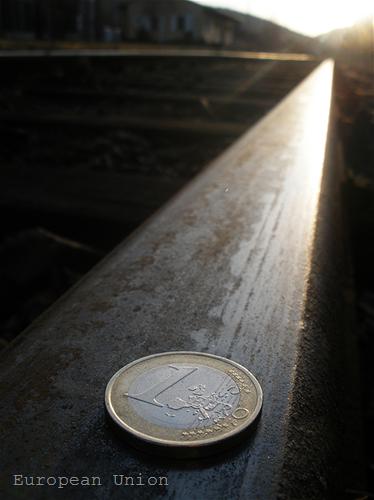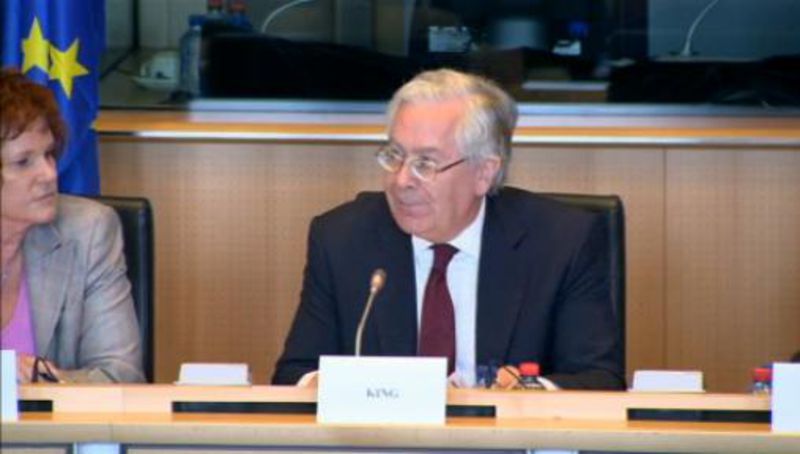Greece is only the occasion but what is the reason?
Adelina Marini, March 4, 2010
 Strange things are happening lately to the single European currency - the euro. Under the rumble and the splashes, caused by the financial storm in Greece, it appears that very dangerous things are swimming underneath, which show that no one in this world depends on himself only, that the economy has reached the boundary of its interconnectivity and now implosion is possible. To the extent that it would be harder and harder to find a global compromise on the main world currencies. In fact, this is a discussion which started several years ago but, so far, there was a relative truce because things were going on relatively well.
Strange things are happening lately to the single European currency - the euro. Under the rumble and the splashes, caused by the financial storm in Greece, it appears that very dangerous things are swimming underneath, which show that no one in this world depends on himself only, that the economy has reached the boundary of its interconnectivity and now implosion is possible. To the extent that it would be harder and harder to find a global compromise on the main world currencies. In fact, this is a discussion which started several years ago but, so far, there was a relative truce because things were going on relatively well.
But since the hard stages of the financial and economic crisis are now over, it is expected another crisis to emerge, maybe even more severe - a currency crisis. It is also possible all this to be just an exaggerated fear but here are several facts which speak for themselves.
1. The business appendix to the New York Times a day ago reported that hedge funds who had representatives at a special dinner, organised by a brokerage house, should preserve records of their bets against the euro. The request was sent by the American Justice Department and is another consequence of the scandal that erupted several weeks ago with the revelation that American investment banks traded with Greek debt, thus helping Athens to hide its real financial situation which helped Greece to enter the eurozone with all criteria fulfilled.
The issue is now openly debated in the American Congress where it is expected hearings to take place soon. And at the mysterious dinner one of the most discussed topics was the euro depreciating against the dollar, and the question now is whether certain investors agreed to make bets against the currency in concert, which would be collusion, or whether they acted independently.
2. In the meantime, Bloomberg, quoted by the leading global newspapers, reported that George  Soros had started a new attack on the euro by artificially raising the price of gold. His fund Soros Fund Management LLC had invested three times more money than usual in the last months. In his regular lectures, published frequently in the Financial Times, he warns that the euro might not survive the current crisis because the monetary union does not have the solid back of a political union. Each currency has a central bank and a Treasury. The euro has a Central bank, Soros says, but it does'nt have a common Treasury which was why the financial crisis led to individual rescue solutions.
Soros had started a new attack on the euro by artificially raising the price of gold. His fund Soros Fund Management LLC had invested three times more money than usual in the last months. In his regular lectures, published frequently in the Financial Times, he warns that the euro might not survive the current crisis because the monetary union does not have the solid back of a political union. Each currency has a central bank and a Treasury. The euro has a Central bank, Soros says, but it does'nt have a common Treasury which was why the financial crisis led to individual rescue solutions.
In his lecture, published on February 21st in the Financial times Mr Soros writes that the EU finance ministers Council (ECOFIN) at their last meeting for the first time committed itself “to safeguard financial stability in the euro area as a whole”. But they have not yet found a mechanism for doing it because the present institutional arrangements do not provide one. Although, the financier writes, Article 123 of the Lisbon treaty establishes a legal basis for it. euinside wrote on the matter 2 years ago, quoting another article of the Lisbon Treaty which also gives more opportunities for common European decisions.
Soros offers the following solution: the euro countries to issue jointly and severally guaranteed euro bonds to refinance, say, 75 per cent of the maturing debt of Greece. This would be the equivalent of an assistance from the International Monetary Fund. According to Soros, however, such a decision is politically impossible at present because Germany is adamantly opposed to serving as the deep pocket for its profligate partners.
 He raises another problem too, which is still in the shadows of Greece - even if Greece is rescued that leaves Spain, Italy, Portugal and Ireland as unsolved issues as well. Together they constitute too large a portion of euro land to be helped in this way. These are countries with enormous public debt. The survival of Greece would still leave the future of the euro in question, Soros concludes in his article in the Financial Times.
He raises another problem too, which is still in the shadows of Greece - even if Greece is rescued that leaves Spain, Italy, Portugal and Ireland as unsolved issues as well. Together they constitute too large a portion of euro land to be helped in this way. These are countries with enormous public debt. The survival of Greece would still leave the future of the euro in question, Soros concludes in his article in the Financial Times.
Of course, no matter of the measures the US is taking to investigate the speculations with Greek debt, this would not reduce significantly the pressure over the single currency from speculative funds.
3. We can also assume how serious the problem is reading the appeal of the Liberals in the European Parliament (ALDE), a special European Commission's representative to be sent in Greece to oversee whether the austerity plan is being implemented by the Greek government which, on its part, is facing serious public pressure by strikes and protests. According the leader of ALDE, the former Belgian premier Guy Verhofstadt, drastic circumstances call for drastic measures. "A credible austerity plan is clearly desperately needed to bring Greek public accounts into line but in order to reassure the markets and European taxpayers, there should be close supervision of Greek budgetary policy by a Commission representative until the deficit is down to the level required by the Stability Pact (3%)."
In case the euro would survive the current situation this would be, in fact, a very good lesson, teaching us that all those documents, recommendations, requirements which seem quite boring and written with the specific bureaucratic Brussels slang, had their point. But some governments preferred not to look beyond their ratings or the upcoming elections. This is also a lesson for those countries, no matter how developed they think they are, who had not yet realised that the world is no longer the same. So, nations like Italy and Spain, who boast that they are in the top of the chart of industrialized states, maybe should start realizing that economy power criteria are different now.
This will also be a lesson for the political and social attitudes in the EU, which suffers from a difficult form of euro skepticism because of the exhausting enlargement, because of deliberations on how to make EU both a full-fledged Union, capableof of standing side by side with the US, China, Russia, Brazil, India and, in the same time, remain a good company of like-minded nations who, after a good food and drink, go home. And so until the next gathering.
 | © European Union
| © European Union | © European Union
| © European Union | © European Union
| © European Union